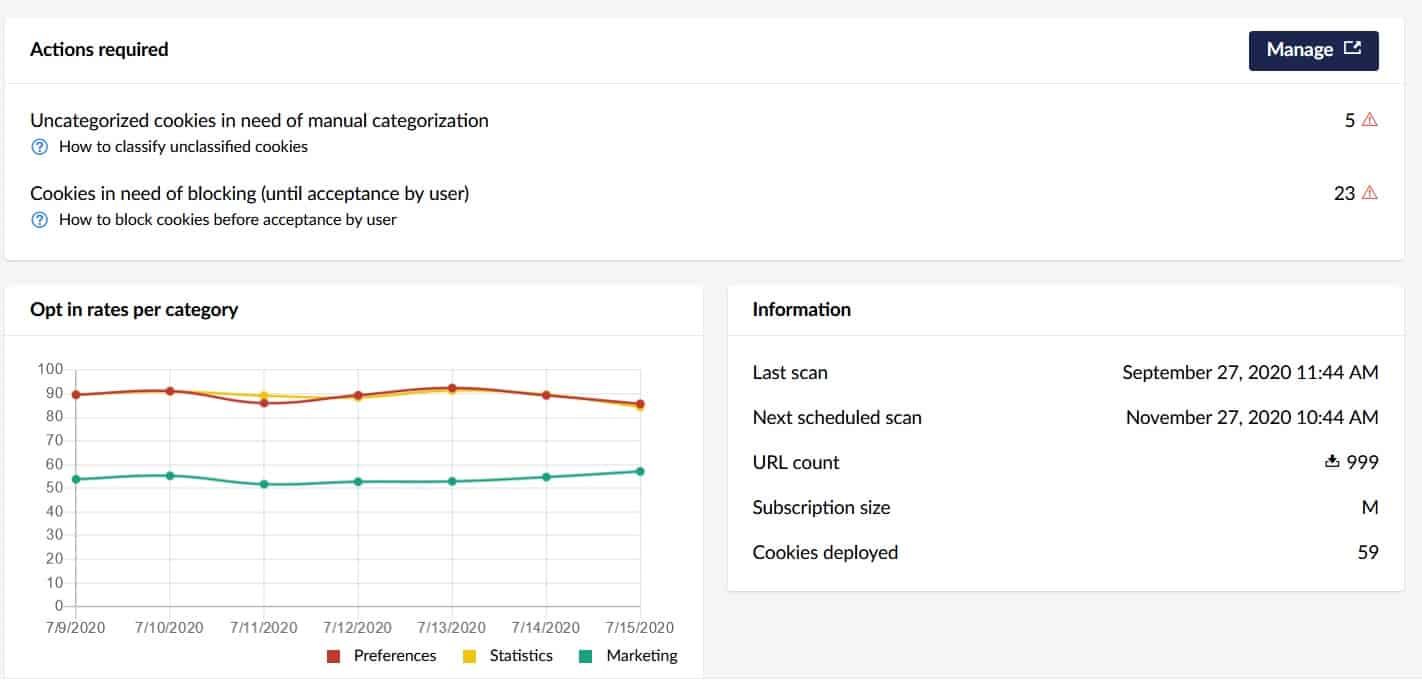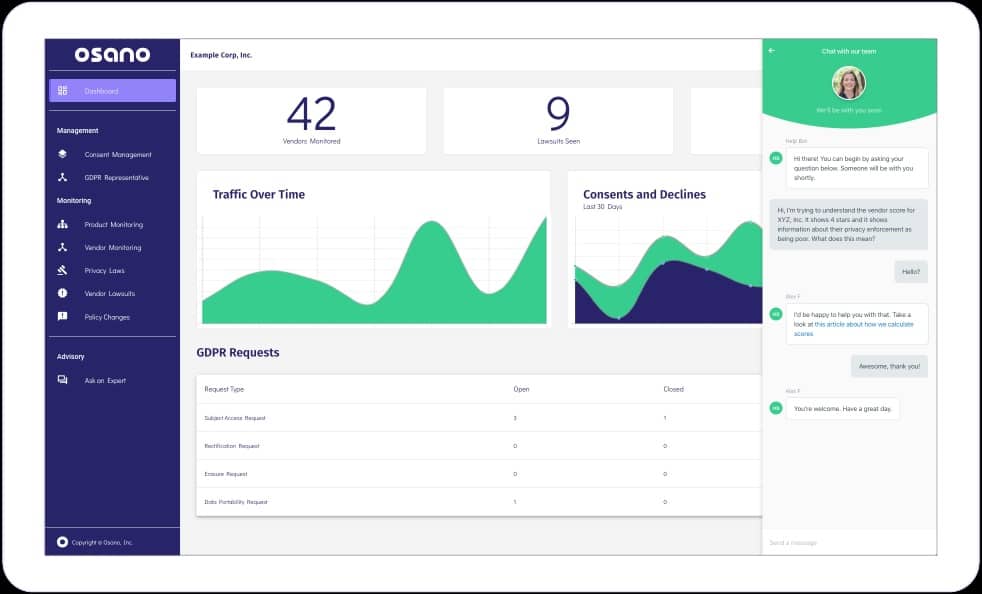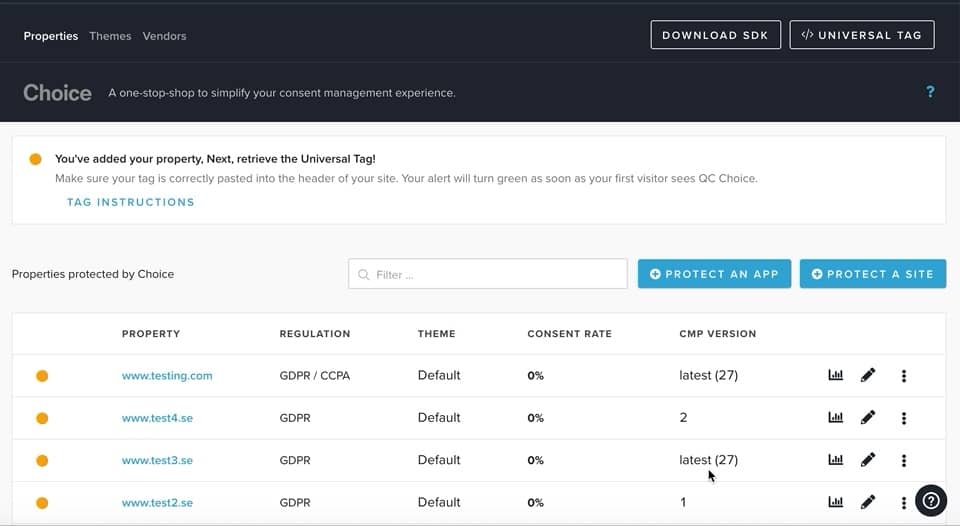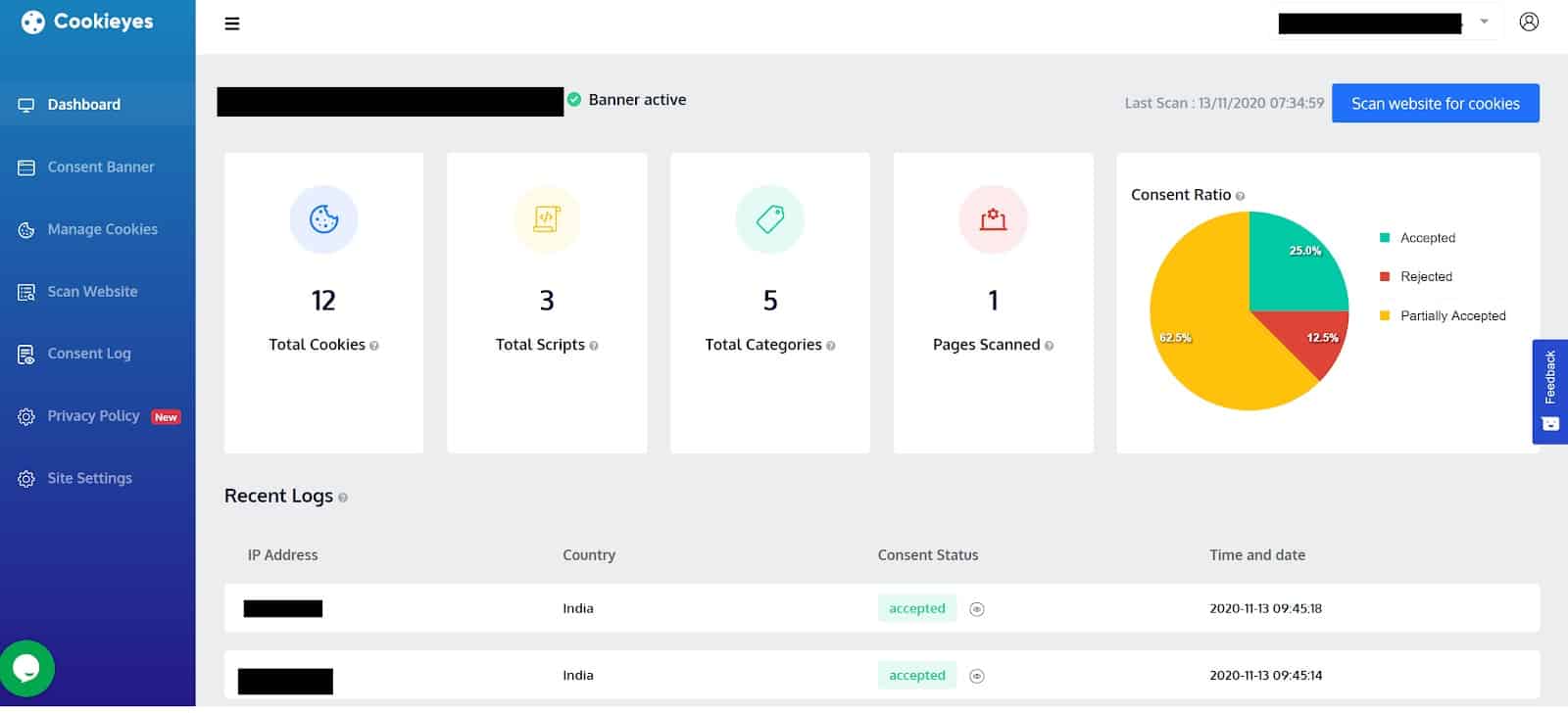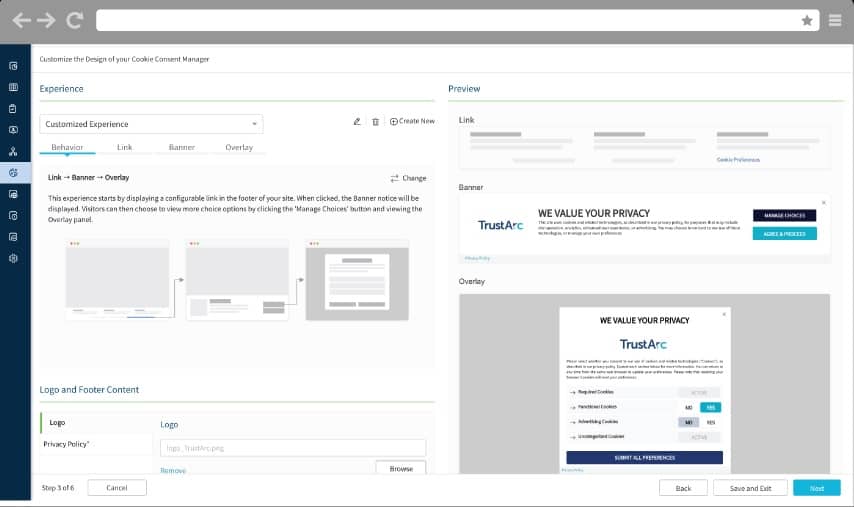There are now many actions on websites that require user consent thanks to legislation in different parts of the world. The location of your web servers, your backend system, and the country in which the visitor resides all influence exactly what you should seek consent for.
Here is our list of the best cookie consent tools:
- Ketch EDITOR’S CHOICE This cloud-hosted platform integrates easily with existing systems to gather cookie consent, manage responses, serve data requests, and enforce preferences. Access a free trial.
- Usercentrics Cookiebot (FREE TRIAL) Popular website consent management tool for the compliant use of cookies and online tracking. A hosted consent management platform that offers cookie consent banners in 46 languages. Start a 14-day free trial.
- Enzuzo (FREE TRIAL) A user-friendly cookie consent manager that allows your audience to stay on top of their consent, preferences, and first-party data. Start on the free plan.
- Osano Consent Manager This cloud-based privacy management platform helps websites comply with data protection regulations like GDPR and CCPA by managing user consent for cookies and tracking technologies.
- InMobi CMP A free consent and compliance service from a cloud platform that specializes in consumer sampling and modeling.
- Piwik Pro Consent Manager A consumer tracking and market analysis service that includes checks for compliance with GDPR, CCPA, and LGPD plus cookie consent for the tracking libraries that the service deploys.
- CookieYes A straightforward cookie consent system that can be integrated into all of the major content management systems.
- TrustArc Cookie Consent Manager A hosted cookie management service that automatically adapts to the location and browser settings of the site visitor.
The requirement for consent to cookies when a visitor first arrives at a site is a much more complicated issue than you could imagine. If you are setting up your website for the first time, you might wonder whether that cookie consent popup can be managed by a plugin service rather than trying to organize it for yourself. You are right. There are such systems available.
Consent management platforms
There are now so many different permissions that websites need to get from users that a whole industry is rising to meet the function. These are Consent Management Platforms (CMPs). Some providers call their offering a consent management service or a consent management system. You have to be a little careful about abbreviations at this point because CMS also stands for content management systems, an example of which is WordPress.
CMP tools also include systems that allow site visitors to access information about the consent that they have given. So, this aspect of website management ends up becoming quite complicated – it isn’t just a requirement to show a popup with Yes and No buttons. CMP providers need to store user consent data and there are even laws that dictate where those consent records can be held. There is no bar to tracking user activity or sharing user information just as long as you get the right consent for those actions.
Cookie consent tools form part of the services offered by CMPs and they are implemented as APIs. That means that you just need to include a line of code at the top of your Web pages to get all of the cookie consent obligations taken care of. CMPs also host the processing of the cookie consent. As they are hosted services, you don’t have to worry about making space on your own servers or your cloud hosting system because that issue is usually taken care of and included in the CMP price.
The Best Cookie Consent Tools
When looking for cookie consent tools, we didn’t limit our search to services that just insert a cookie notification popup in your website. We expect cookie consent tools to provide much greater functionality.
What should you look for in cookie consent tools?
We reviewed the market for cookie consent services and analyzed the options based on the following criteria:
- A platform that includes the management of visitor consent records
- A system that can manage other consent issues, such as GDPR data storage location consent
- A managed service that offers an API to deliver all consent popups
- A dashboard that enables you to view all consent activities
- A service that can easily integrate with other Web platforms, such as hosting platforms or content management systems
- A free trial for a cost-free assessment period or a tool that is free to use
- Value for money and easy payment plans without any lock-in periods or upfront installation charges
Using our guidelines, we settled on a shortlist of suitable services to consider. There are actually many very good cookie consent systems available today. We believe that we have found the best of them.
You can read more about these services in the following sections.
1. Ketch (FREE TRIAL)
Ketch is a cookie consent platform. It is designed to help businesses comply with global privacy regulations, including the GDPR, CCPA, and other data protection laws. By providing a seamless user experience, Ketch ensures that websites can manage cookie consent in a way that respects user privacy while minimizing friction in the consent process.
The platform simplifies compliance with cookie regulations and helps users manage their data preferences in an easy-to-use interface. Through its extensive features, Ketch empowers businesses to protect their users’ privacy while building trust in their brand.
Key Features:
- Interprets User Consent: Management of data flows within an organization, maintaining compliance with user preferences and regulatory requirements.
- Manages Multiple Regulations Simultaneously: The platform adapts to changing business models, evolving rules, and variations triggered by visitor locations.
- Adaptive Consent Management: Automatically adjusts consent experiences to align with global privacy laws like GDPR and CCPA.
- Delivering On-Brand Experiences: Tools to create consent banners and privacy experiences that match your brand.
- Ensuring Privacy Everywhere: Effective data privacy is maintained across all user interactions, not just on the main webpage.
Why do we recommend it?
We recommend Ketch for its comprehensive cookie consent management and privacy features. It helps businesses comply with privacy laws like GDPR and CCPA while offering flexible, easy-to-deploy solutions. Ketch’s customizable banners and powerful reporting tools make it a reliable choice for organizations aiming to maintain compliance without sacrificing the user experience.
Ketch offers a variety of tools to help businesses gain consent, manage cookies, and provide transparency. One of the platform’s most important features is its customizable consent banner, which can be tailored to fit a company’s website design and branding. The platform also integrates with a wide range of third-party tools, enabling quick and easy deployment and management of consent banners. The service supports dynamic consent collection and provides detailed reports on consent status, ensuring compliance and documentation.
Ketch offers multiple pricing tiers, each designed to accommodate businesses with different needs and visitor volumes. The Free Plan is suitable for small businesses and startups, offering basic cookie consent management and access to essential features such as customizable banners and consent tracking. The Starter edition is the cheapest paid plan available and it caters to low-volume websites.
The Plus Plan is aimed at businesses with more complex needs, offering additional functionalities such as geolocation-based consent management, A/B testing for consent banners, and advanced reporting. For large enterprises, Ketch’s Pro Plan includes premium features like priority support, dedicated account management, and integration with internal systems, providing a high degree of customization and scalability.
The premium features offered by Ketch include integration with customer data platforms (CDPs), in-depth analytics, and tools for optimizing user consent preferences. These features help businesses build a better relationship with their users by offering transparency and ensuring that they respect privacy preferences at all stages of the interaction. Ketch makes it easy for organizations to stay compliant with ever-changing regulations while focusing on user experience.
Who is it rcommended for?
Ketch is recommended for businesses of all sizes that want to ensure GDPR, CCPA, and other data privacy compliance. It’s particularly suitable for organizations that require customizable cookie consent management, robust reporting, and advanced privacy features. From small startups to large enterprises, Ketch can scale to meet diverse regulatory needs.
Pros:
- Automated Data Governance: Reduces the burden on businesses by automating data governance processes, ensuring consistency and compliance.
- Sensitive Data Protection: Empowers businesses to manage and protect sensitive information effectively.
- Programmatic Privacy: Innovative approach to privacy that builds trust with customers and ensures compliance with data protection regulations.
- Advanced Security Tools: Offers tools to maintain data governance and security, safeguarding data assets from potential threats.
- Flexible and Adaptable: The platform adapts to changing regulatory requirements and business needs, providing granular control over data privacy.
Cons:
- Complexity in Implementation: May require significant effort and expertise to implement and integrate into existing systems
You can sign up for the Free edition of Ketch or get a free trial of the Starter plan.
EDITOR'S CHOICE
Ketch is our top pick for a cookie consent tool because it offers a powerful, user-friendly, and highly customizable platform for managing cookie consent and ensuring compliance with global data privacy regulations like GDPR and CCPA. Ketch makes it easy for businesses to implement cookie consent banners without requiring extensive technical expertise. The platform ensures that consent collection is not only compliant but also non-intrusive. What sets Ketch apart is its scalability and flexibility. It offers a free plan for small businesses, as well as advanced features for larger enterprises, including geolocation-based consent management, advanced reporting, and integration with other privacy tools. This makes it an ideal choice for businesses of all sizes, from startups to large corporations, as it can grow and evolve with their needs.Ketch’s comprehensive reporting and analytics tools also ensure that businesses can easily track and document consent status, which is crucial for regulatory compliance. Moreover, its ability to integrate seamlessly with third-party tools ensures that businesses can maintain a unified approach to privacy management across their tech stack. Overall, Ketch combines ease of use, flexibility, and powerful features, making it the top choice for managing cookie consent and ensuring privacy compliance.
Download: Access tthe FREE Trial
Official Site: https://app.ketch.com/sign-up
OS: Cloud-based
2. Usercentrics Cookiebot (FREE TRIAL)
Usercentrics Cookiebot is a consent management platform that will scan your site for all cookies and trackers, making it easier to work out what forms of consent are needed from visitors to the website. That categorization is also performed automatically by Cookiebot. This system currently serves more than 400,000 websites and communicates with users in 46 languages. It helps comply with GDPR, ePrivacy, CCPA/CPRA and more. It also integrates with Microsoft and Google Consent Mode for automated signaling on the leading Ad platforms.
Key Features:
- Comprehensive Cookie Analysis: Thoroughly scans and categorizes site cookies.
- Automated Consent Form Generation: Creates consent forms tailored to site needs.
- Legal Compliance Monitoring: Stays updated with global privacy laws and regulations.
- Free Plan for Small Sites: Offers a no-cost option for websites with up to 100 pages.
Why do we recommend it?
Cookiebot has a more accessible pricing model. It is a very similar service to CookieYes but its plans are measured by the number of pages in your site and not the number of visitors. If you only have 100 pages in your site – which is still quite a lot – you can use the service for free. The free plan gets scanning and consent form generation but not analytics features and the consent form shows the Cookiebot logo.
The Cookiebot crew keeps up to date with all consent-related legal developments around the world. Any changes to the legal landscape cause the consent management platform’s detection and management processes to be updated. This is a cloud-based, hosted service, so you don’t have to worry that you have got the latest version of the system.
After scanning your site, the system presents you with a short questionnaire about your business. This results in the generation of a consent banner, which can be customized. The code for this is hosted so you just need to insert a few lines into your site. Those include routines to block cookies that haven’t been consented to.
Who is it recommended for?
Cookiebot is a good choice if you are starting up a website and you have no idea how many visitors you are likely to get each month. It is a lot easier to count the number of pages in your site, even when they run into the thousands. You have to pay for a separate subscription for each site and the price depends on the number of pages in each site.
Pros:
- Accessible Free Option: Suitable for small websites with limited page numbers.
- Dynamic Legal Adaptation: Adjusts consent processes based on the latest legal changes.
- Customizable Banner Options: Allows personalization of the consent banner for branding.
Cons:
- Exclusion of Some Cookies: May require manual management for certain cookies.
The service maintains a consent database for you and allows access to a cloud-based dashboard that details system usage statistics and website user actions. This system is offered in four plans, the first of these being Free. This covers one domain with up to 100 pages. Usercentrics also offers Cookiebot on a 14-day free trial of its paid plans.
3. Enzuzo (FREE PLAN)
Enzuzo is a comprehensive consent management platform that allows your customers to decide on cookies, preferences, and first-party data. Such a customer-centric approach builds trust while enabling you to comply with frameworks, like GDPR and CCPA. It can even display geo-specific cookie consent, making it well-suited for international operations. Moreover, Enzuzo is a Google CMP partner, making it easy to comply with Consent Mode V2 using a GTM template.
Key Features:
- Collection and Storage: Collects and stores valid user consent across multiple sites and subdomains.
- Geo-specific Tagging: Allows you to create consent forms, privacy policies, and cookie banners that conform to the local laws and regulations.
- Displays Consent Logs: Establishes a consent database and maintains audit logs to record and track modifications.
- Cookie Categorization: Scans websites to gather cookies and other tracking technologies, and helps categorize them into different groups.
Why do we recommend it?
We recommend Enzuzo because it puts the spotlight on the user, empowering them to be in control of their cookie preferences. This approach builds trust with visitors and, at the same time, helps meet the compliance requirements of GDPR, CCPA, and more.
Another aspect we love about this tool is its user-friendly interface, making it ideal for users of all backgrounds. Also, its option to customize privacy policies and cookie banners to meet the specific geographic regions makes it ideal for companies with international operations.
Additionally, it scans your website to gather information about cookies and other tracking technologies, and automatically categorizes them. When a user consents to one or more of these categories, it is saved in a secure database. In the case of DSAR, it is easy to retrieve and modify the data.
Who is it recommended for?
It is recommended for organizations of all sizes, especially those that have operations across multiple jurisdictions. It is also a good choice for organizations that have to strictly comply with GDPR, CCPA, and other data security and privacy-focused regulations.
Pros:
- User-friendly: Comes with a user-friendly interface that’s easy for everyone.
- Free Option: Offers a free plan to get started.
- Cookie Categorization: Scans and categorizes cookies.
Cons:
- Complex for Static Websites: May be too complex for static websites.
This platform offers four plans – Starter, Growth, Pro, and Enterprise. Additionally, there’s also a free plan that offers a website privacy policy for GDPR and CCPA. Get started on the free plan.
4. Osano Consent Manager
Osano has been operating its consent management platform since 2016 and it has managed the consent for more than one billion cookies since its launch. The platform is a cloud-based system that scans your sites for relevant cookies and categorizes them. It then generates an appropriate consent form and gives you a code to embed in your Web pages. It covers the requirements for all of the online privacy legislation in the world, including the EU’s GDPR, California’s CCPA, and Brazil’s LGPD.
Key Features:
- Global Privacy Legislation Compliance: Ensures adherence to GDPR, CCPA, LGPD, and more.
- Automated Cookie Discovery: Efficiently scans and categorizes site cookies.
- Legal Landscape Monitoring: Keeps up-to-date with changing privacy laws worldwide.
- Free Plan Availability: Offers a no-cost option for smaller website needs.
- Comprehensive Cookie Management: Provides full control over cookie consent and recording.
Why do we recommend it?
Osano Consent Manager offers Data Privacy Management but those who just want a cookie consent tool can get that level of service from the platform for a much more affordable price. Cookie consent doesn’t have to be complicated and small businesses with websites can get through all of the legal requirements of doing business today with the self-service editions of the Osano platform.
The platform offers a bundle of services and the exact contents of the system you get depend on the plan that you choose.
Osano offers three Data Privacy Management plans. However, if you are running a website and you just need to sort out cookie consent obligations, you need to look at the two Self-Service Cookie Consent plans. These are Free, which activates on 5,000 page loads per month, and the Plus edition, which operates for up to 30,000 impressions per month.
If the Free plan interests you, be aware that it is pitched for use by private individuals, so don’t sign up with a company name. Also, it only covers one website. However, as it is free, you could easily just open a new account for each website. The plan indexes all of the cookies that your website code wants to download and optionally blocks them according to the user’s responses on the launch of the site in a browser.
For more throughput, you need to go for the Business plan. That covers two domains and will cater to 30,000 site visitors. The Business + plan covers four domains and will serve up to 50,000 visitors, and the Enterprise plan has no limit on the number of sites it will work on and there is also no limit on the number of visitors it will interact with.
Osano isn’t just an automated system. The company has a legal team that not only adjusts the service of the platform whenever the law changes but it also supports clients. The system tracks the legal statuses of the businesses you collaborate with and provides full legal support for online privacy issues.
Who is it recommended for?
Osano is a good service for websites that don’t expect to get a lot of volume. If you are a small business owner just starting out, take the Free plan for Osano to cover your site’s legal obligations while you discover your average monthly turnover.
Pros:
- Legally Robust Consent Records: Maintains detailed consent documentation for compliance.
- Flexible Plan Options: Scales to accommodate various business sizes and needs.
- Dynamic Cookie Classification: Automatically categorizes cookies for appropriate action.
- User-Friendly Interface: Simplifies management of cookie consent processes.
- Extensive Legal Support: Backed by a dedicated legal team for ongoing updates and support.
Cons:
- Limited SLA in Basic Plans: Service Level Agreement mainly offered in higher-tier plans.
- Pricing Structure: Higher plans can be costly, especially for businesses with higher visitor volumes.
Osano doesn’t offer free trials. Instead, after you sign up, the company takes a month to make its first charge and you can cancel during that period. If you are cautious about starting a contract before seeing the service in operation, you can access a demo to assess the system without obligation.
5. InMobi CMP
InMobi CMP (formerly Quantcast Choice) platform is a consumer behavioral analysis system. It also offers a consent and compliance management service, which is called Choice. This is a free service that checks on APIs and other systems associated with your site and identifies their GDPR and CCPA issues. The tool then compiles a suitable cookie consent popup to suit.
Key Features:
- Consumer Behavior Analysis: Provides insights into site visitors’ interactions.
- Free Cookie Management: Offers a no-cost solution for GDPR and CCPA compliance.
- Automated Cookie Discovery: Identifies and categorizes cookies efficiently.
- Compliance-Centric Design: Tailored to meet GDPR and CCPA requirements.
- Risk Analysis of Partners: Evaluates third-party affiliations for potential privacy risks.
Why do we recommend it?
InMobi CMP is a very tempting service because it is free to use and it partners with an optional consumer modeling system for marketing analysis. This system will identify all of the cookies in your site and generate a suitable consent form. It will host that form for you and record responses.
InMobi CMP is a cloud-based service. You enter your site’s URL and whether it needs to comply with GDPR and/or CCPA. After filling out site scope details, the system generates a consent form. The service is also able to track the suitability of the partners that you work with and examines their reputation scores and use of data. This is to see whether bad practices in other companies could impact your own system reputation and expose you to litigation.
Who is it recommended for?
InMobi CMP makes an offer that is hard to refuse because it takes care of the legal complexities of running a website at no cost. It even provides you with a third-party risk analysis. So, this is a good tool to use if you paid a Web development company for your site and you have no idea what cookies are in there or how to manage cookie consent. One problem is that InMobi CMP gathers statistics on your site as it gets served to visitors.
Pros:
- No-Cost Compliance Tool: Ideal for budget-conscious businesses needing legal compliance.
- Third-Party Risk Assessment: Adds an extra layer of security by evaluating external partners.
- Ease of Use: Simplifies the process of legal compliance for website owners.
- Comprehensive Cookie Management: Effectively handles consent for various cookies and APIs.
Cons:
- Data Use for InMobi CMP Purposes: The collected data may be used by Quantcast for its analysis.
- Potential Privacy Concerns: Some businesses may be wary of sharing data with a consumer analytics platform.
The InMobi CMP system records all of the consent-related actions that it performs on behalf of each client and those logs can be accessed in the account dashboard. The system console is based in the cloud and reachable through any standard Web browser from anywhere. This is a very easy system to work with and the fact that it is free to use makes it very enticing.
6. Piwik Pro Consent Manager
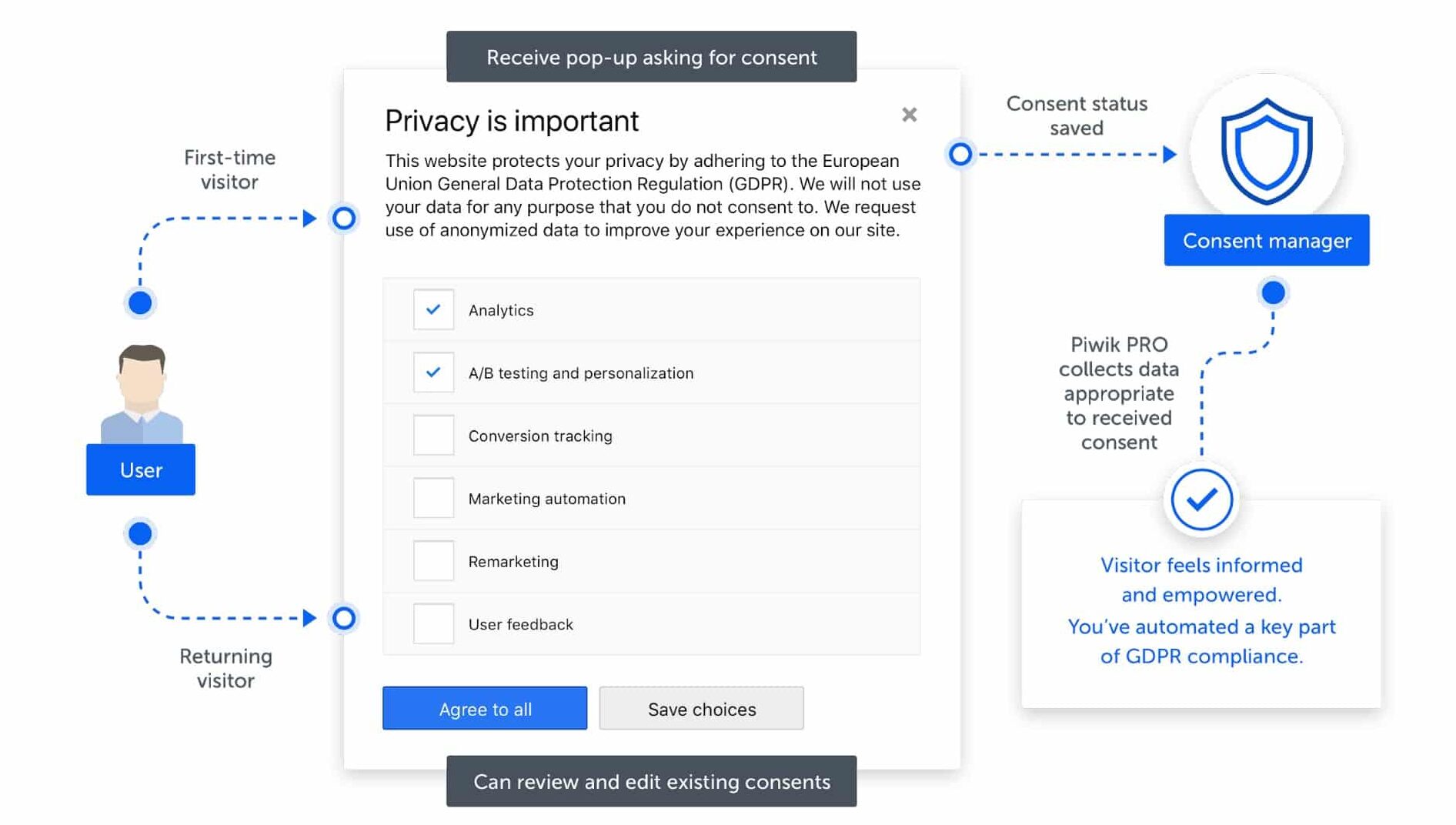
Piwik Pro is a market research platform that measures the behavior of Web users and the performance of sites. It offers compliance management for the data privacy laws of the EU, the USA, Brazil, China, and Russia. The platform also offers extra routines to meet the requirements of HIPAA.
Key Features:
- Integrated Marketing Analysis: Combines consent management with consumer behavior tracking.
- High Visitor Volume Capacity: Suits businesses with up to 500,000 visitors per month.
- Tag Management System: Assists in organizing and managing site tags and scripts.
- Customizable Consent Management: Tailors consent processes to specific site needs.
Why do we recommend it?
Piwik Pro Consent Manager is part of a marketing analysis system that is free to use. This is a similar prospect to Quantcast, except the marketing analysis and cookie consent systems are bundled together – you can’t take one without the other. The volume that the free account provides caters to 500,000 visitors per month, which is a much higher volume than you get with the Business + plan of Osano.
As well as the consumer monitoring services of Piwik Pro, the system offers a Tag Manager, which helps you to document and manage your tags, pixels, and JavaScript code. Those tags tie into the consumer behavior tracking and so, these are the cookies that site visitors need to be informed about – this is where consent requirements come in.
The Consent Manager structures all activities related to cookie acceptance, including access to a system for users who want to change their settings.
The Customer Data Platform in the Piwik Pro system allows subscribers to see and analyze all of the consumer behavior statistics that were gathered by the cookies on your site. This information can be tied in with your CRM and there are also templates available for landing sites, request forms, and feedback questionnaires to gather more consumer actions and opinions to hone targeting.
Who is it recommended for?
Piwik Pro is a rival system to Quantcast and if you are interested in using a market and performance analysis tool for your website, these two options are worth considering and comparing. While Quantcast will generate a cookie consent for all of the cookies that it discovers in your site, Piwik Pro only provides a consent form for the cookies that its own system places in your Web pages – you will have to sort out some other consent management tool if you also have third-party trackers, such as those placed by Google Ads.
Pros:
- Broad Visitor Coverage: Suitable for sites with significant monthly traffic.
- Comprehensive Consent Structure: Manages consent for Piwik Pro-generated cookies effectively.
- CRM Integration: Enables combining consumer data with customer relationship management systems.
Cons:
- Limited to Piwik Pro Cookies: Only manages consent for cookies related to its own system.
- Bundled Services: Consent management is not offered as a standalone service.
The Consent Manager isn’t available as a separate service. Instead, you get a bundle of all modules and you have a choice of which global region your account will be hosted in. You can request a demo that lets you see how all of the tools fit together.
7. CookieYes
The major strength of CookieYes is its integration for all of the major content management systems. These include WordPress, Drupal, Magneto, Blogger, Joomla, and Wix. The cookie consent banners that this system will generate are formed to provide compliance with the requirements of GDPR.
Key Features:
- CMS Integration: Seamlessly works with major content management systems.
- GDPR Compliance Focus: Ensures adherence to GDPR requirements.
- Automated Cookie Discovery: Identifies and categorizes site cookies for management.
- Customizable Consent Banners: Offers personalization of cookie consent forms.
Why do we recommend it?
CookieYes is a rival to Osano and it is a tenth of the price while offering more throughput per month. The CookieYes service will scan your site and generate a consent form. It then stores the response to that form and blocks cookies from triggering according to the visitor’s response.
The system isn’t only available to those using CMSs – you can also apply it to your custom websites. This is a flexible and easy-to-use service, but the downside of its simplicity is that it doesn’t have any of the consumer analysis tools or legal services integrated with some of the other systems on this list.
Users of CookieYes, fill out a form on the system dashboard with details about the site. The system then scans the site, compiles a cookie list, and then generates code for the consent banner and you cut and paste this into the pages of your site. Along with an appropriate popup, the code will also manage the actions that need to be performed after the user has selected an option in the form. That means that it can block cookies that the user hasn’t accepted.
Although this is a simple system, it is very successful. The service is used by more than a million websites, including those of CNBC, Reuters, and Hilton. You have the opportunity to customize your consent popup. The system also hosts a consent database of user responses.
Who is it recommended for?
CookieYes is a good option for all website businesses. There is a free option for sites that are not expected to gain more than 25,000 visitors per month. Prices are very affordable and even the top plan is less than half the price of Osano’s cheapest package. The downside to this offer is that you have to go all the way up to the top plan in order to get rid of the CookieYes logo on the consent form – which some might feel looks amateurish.
Pros:
- CMS Compatibility: Ideal for websites built on platforms like WordPress, Drupal, and others.
- Affordable Plans: Offers a free option and reasonably priced paid plans.
- User-Friendly Implementation: Simplifies the integration process with generated code snippets.
Cons:
- Limited Non-CMS Compatibility: May not be as effective for custom-built websites.
- CookieYes Branding in Lower Plans: Presence of CookieYes logo on consent forms in basic plans.
CookieYes has four plans and the first of those is Free. That option is limited to just 5,000 access records per month. The paid plans offer many more services. The paid plans are all available for a 14-day free trial.
8. TrustArc Cookie Consent Manager
The TrustArc Cookie Consent Manager is a cloud platform that implements compliance procedures for websites. It locates and identifies all of the cookies and trackers built into a website and then categorizes them. This system coordinates all of the actions that you need to take to stay compliant with regional privacy laws and avoid fines and litigation.
Key Features:
- Global Legal Compliance: Ensures adherence to privacy laws across multiple regions.
- Automated Cookie Management: Efficiently discovers and classifies site cookies.
- Multi-Lingual Support: Offers consent banners in 45 languages.
- Hosted Consent Manager: Provides a cloud-based platform for consent management.
Why do we recommend it?
TrustArc Cookie Consent Manager offers two plans but doesn’t display prices for either. However, there are no volume restrictions in the plan definition either for visitor numbers per month or website page counts. The service boasts that it covers consent legal requirements for every country in the world.
Once all cookies have been identified, TrustArc compiles the appropriate cookie consent banner for you. This system is hosted on the TrustArc site and called as an API within your site. The banner creation process is interactive and the resultant popup can be customized to include your business’s branding.
The TrustArc service doesn’t stop at banner generation. The system will implement actions based on the responses of users to the consent request. This may involve blocking some of the cookies on your site. The system also records each consent response for future reference.
The procedures followed by the Cookie Consent Manager adapt to the location of the Web server and the location of the visitor. These factors influence which standard the site’s cookie policy needs to comply with. The notification banner can be shown in 45 different languages – the system detects the browser’s language preferences before sending the banner.
Who is it recommended for?
TrustArc is a constantly reviewed system with its own team of legal experts, so you can be assured that your sites are legally covered by this service as the legal landscape changes. The system scans your site to discover cookies and generates a consent form for you. Thus, you don’t need any technical knowledge to use this system. The consent form is hosted in the cloud and you get access to a console with statistics and analytical tools plus visit-level consent records in the event of legal action.
Pros:
- Comprehensive Legal Coverage: Addresses privacy requirements of every country.
- Customizable Consent Banners: Allows branding inclusion in the consent process.
- Location-Aware Consent Actions: Tailors consent forms based on visitor and server locations.
Cons:
- Lack of Free Option: No cost-free plan for smaller or budget-conscious businesses.
- Not Displayed Pricing: Prices for plans are not readily available on the website.
The TrustArc package is completed by performance monitoring and compliance reporting services available in the system dashboard. You can experience TrustArc Cookie Consent Manager on a 14-day free trial.
Cookie consent tools FAQs
What is cookie consent Tool?
A cookie consent tool is called a cookie consent manager. This is usually a hosted service that provides the discovery, recording, and categorization of cookies in a site and then identifies the types of consent that the site needs from users. The cookie consent manager then generates an appropriate banner, which you integrate into your site with a line of code. The consent banner will appear when your site loads and user responses are recorded by the consent manager. The cookie consent manager will then block cookie actions accordingly.
How do you implement GDPR cookie consent?
The easiest way to implement GDPR cookie consent on a site is to use a cookie consent manager. If you resent shelling out money for this requirement, don’t worry: there are many free cookie consent management services available.
Do I need cookie consent on my website?
If your website uses cookies, you will need to seek cookie consent.



